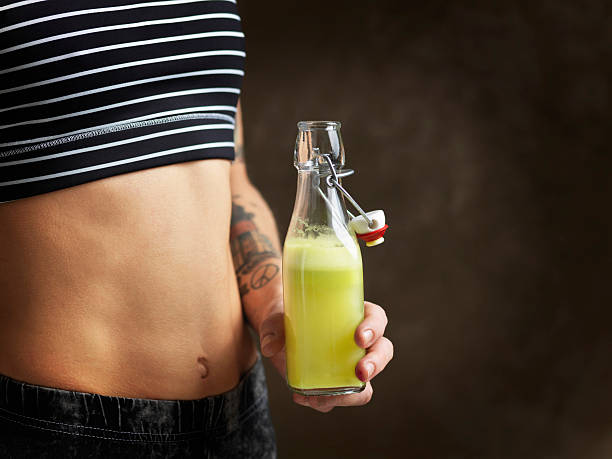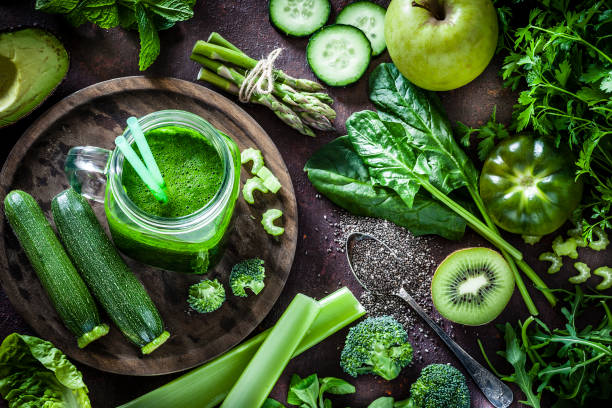Detox for gut health and weight loss
What do you mean by detox for gut health and weight loss? Your general health can benefit from detoxifying your body and maintaining gut health, both of which may help you lose weight. The term “detoxing” can mean different things to different people, and there isn’t any scientific proof to back up the efficacy of any particular detox diet or treatment.

Here are some broad pointers to promote gut health and might help you lose weight:
Increasing fiber consumption is possible by eating a diet high in fruits, vegetables, whole grains, legumes, and nuts. Fibre helps you feel full, which may prevent overeating. It also encourages good digestion and regular bowel motions.
Keep hydrated: Drinking enough water to boost your body’s disposal of waste products and to maintain healthy digestion.
Consume foods that are high in probiotics to improve gut health. Probiotics are good bacteria. Include fermented foods like kimchi, sauerkraut, yogurt, kefir, and others into your diet.
Limit your intake of processed meals and added sugars because both can have a bad impact on your gut health and cause you to gain weight. When possible, choose entire, unprocessed meals.
Moderate alcohol consumption: Heavy drinking has been linked to weight gain and gut health problems. It’s advisable to either drink in moderation or not at all.
Control your stress: Long-term stress might harm your digestive system. Take part in stress-relieving exercises, meditation, deep breathing exercises, or enjoyable hobbies.
Engage in regular physical activity: By helping you to burn calories and enhance your general health, regular exercise can help you lose weight. It may also support a healthy digestive system.
Remember, before making large dietary changes or beginning a new detox regimen, it’s always a good idea to speak with a healthcare provider or a qualified nutritionist. They can give you individualized guidance based on your unique needs and assist you in coming up with a plan that works best for you.
What is Detox?
Detoxification, often known as detox, is the process of eliminating toxic substances, toxins, or waste products from the body. Detoxification aims to promote the body’s natural detoxification processes while enhancing general health and well-being.

The word “detox” is frequently used in a variety of settings and can refer to a wide range of procedures or techniques, including:
Medical detox: This describes the managed withdrawal process for people who are physically addicted to drugs or alcohol. To manage withdrawal symptoms and guarantee a secure and comfortable procedure, medical personnel may provide drugs and offer supportive care.
Natural detoxification: This entails altering one’s lifestyle and forming better routines in order to support the body’s inherent detoxification processes. It usually focuses on diet, hydration, exercise, and rituals like sauna sessions, fasting, or certain diets.
Cleanses/Detox diets: Cleanses and detox diets are temporary dietary therapies intended to help the body get rid of toxins. They often involve consuming a specific set of foods, juices, or herbal supplements while avoiding certain foods or food groups. However, there is disagreement among medical specialists regarding the efficacy and safety of detox diets.
Is detox really effective for gut health and weight loss?
Detoxification is a word that is frequently used to describe various dietary plans or practices intended to remove toxins from the body in the context of intestinal health and weight loss. However, it’s crucial to remember that the idea of detoxification, as it is frequently presented in popular culture, is unsupported by science and frequently rests on pseudoscience.
The liver, kidneys, and gastrointestinal tract are the main organs responsible for the body’s natural detoxification processes. Together, these organs process and remove waste products and toxins from the body. There is no scientific evidence to support the assumption that particular detox diets or products can increase or expedite this process; they are very effective at carrying out these duties.

Furthermore, it’s frequently false to claim that detox diets or practises result in substantial weight loss. Any weight loss that occurs during a detox programme is largely the result of calorie restriction or water loss rather than a particular impact on toxins. These weight losses are frequently transient and can be restored after returning to regular eating habits.
Focusing on long-term lifestyle adjustments that advance general health is typically more successful if you’re worried about your weight or gut health. This include keeping up a balanced diet, exercising frequently, controlling stress, getting enough sleep, and drinking plenty of water. It’s always advisable to speak with a healthcare professional if you have specific health issues so that they can offer you individualised guidance based on personal requirements.
Difference between weight loss diet and Detox diet
Although there may be some overlap, a detox diet and a weight loss diet are two different strategies with separate goals. The main distinctions between the two are explained as follows:
Diet for weight loss:
The main aim of a diet for weight loss is to reduce body weight by producing a calorie deficit. To lose excess body fat, the emphasis is on burning more calories than you take in. Diets for weight loss often involve keeping an eye on calories and controlling portion sizes. They place a strong emphasis on maintaining an overall calorie deficit while consuming a well-balanced combination of macronutrients (carbohydrates, proteins, and fats).

Diet to detox:
The main objective of a detox diet is to get toxins and waste out of the body in other words detox for gut health and overall well-being. The objective is to improve general health, promote the body’s natural detoxification processes, and maybe relieve signs and symptoms like bloating or weariness. In general, detox diets advocate for taking particular foods, drinks, or supplements that are thought to hasten the detoxification process, like fruits, vegetables, herbal teas, and water. They frequently leave out refined carbohydrates, caffeine, alcohol, processed meals, and other potentially dangerous ingredients.

Detox diets for effective weight loss and improve gut health
A detox diet is frequently used to lose weight and enhance intestinal health. Even though the idea of detoxing is not backed by science, you may still make dietary decisions that assist in weight loss and a healthy gut. Here are some general principles to take into account:
Fiber intake: Focus on eating full, unprocessed foods like fruits, vegetables, whole grains, legumes, and nuts to increase your intake of fibre. These are high in fibre, which supports a healthy gut microbiota, aids with digestion, and makes you feel fuller for longer.
Always stay hydrated: Keep hydrated by consuming enough water throughout the day. Water stimulates digestion, aids in toxin removal, and keeps you feeling full. Water that has been infused with herbs can also be refreshing.
Avoid processed foods: Restrict your intake of processed foods, such as refined grains, sugary snacks, and meals high in chemicals and preservatives. These foods frequently lack nutrition and can harm your digestive system.
Lean protein diet: Choose lean proteins such as skinless poultry, fish, tofu, and lentils wherever possible. Protein provides a sensation of fullness and aids in muscle growth and repair.
Probiotic-rich foods: Include yogurt, kefir, sauerkraut, and kimchi in your diet as examples of fermented foods. These foods have good bacteria that can help maintain a balanced gut microbiome.
Say no to added sugars: Limit your intake of sweetened beverages, sweets, and processed foods to reduce added sugars. Overconsumption of sugar can harm gut health and cause weight gain.
Mindful eating: Eat mindfully by paying attention to your body’s signals of hunger and fullness. Eat gently, take time to enjoy what you’re eating, and stop when you’re satisfied but not overstuffed.
Healthy fats: Include sources of healthy fats in your diet, such as avocados, nuts, seeds, and olive oil. These fats aid in satiety maintenance and are necessary for the absorption of nutrients.
No caffeine and alcohol: Limit your use of alcoholic beverages and caffeinated beverages because they can disturb your sleep and badly impact your digestion.
Speak with a healthcare provider: It’s always a good idea to speak with a certified dietician or another healthcare provider who can offer individualized advice if you have any particular health issues or dietary limitations.
Conclusion
Always remember, before making large dietary changes or beginning a new detox regimen, it’s always a good idea to speak with a healthcare provider or a qualified nutritionist. They can give you individualised guidance based on your unique needs and assist you in coming up with a plan that works best for you.
